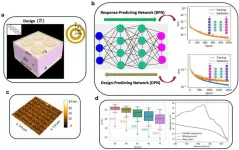(Press-News.org) CLEVELAND, Ohio (Jan 15, 2025)—Artificial intelligence (AI) is positioned to make a major impact on almost every industry, including healthcare. A new study suggests that machine learning models can more quickly and affordably identify women with severe subjective cognitive decline during the menopause transition, effectively opening the door to better management of cognitive health. Results of the study are published online today in Menopause, the journal of The Menopause Society.
Subjective cognitive decline refers to a person’s perceived decline in memory or other cognitive functions. Cognitive decline, one of the more common symptoms related to the menopause transition, is especially concerning, because it not only affects a woman’s quality of life but can also indicate a higher risk of severe neurodegenerative diseases, such as Alzheimer disease.
Previous evidence suggests a number of risk factors for cognitive decline, including aging, hypertension, obesity, and depression, among others. A challenge is that most current models for cognitive health are centered around dementia, an incurable disease that offers limited opportunities for clinical intervention. Although subjective cognitive decline does not always predict long-term cognitive changes or dementia, a predictive model for cognitive decline and related factors could allow for early intervention to protect cognitive health.
Existing testing for cognitive performance is largely based on models typically incorporating various laboratory indicators such as blood glucose, blood lipids, and brain imaging. The complexity and high cost of these models often make them impractical to implement in a clinical setting. In comparison, questionnaire-based models offer a simpler and more cost-effective alternative. These models rely on a number of independent variables, including sociodemographic, work-related, menstrual-related, lifestyle-related, and mental health-related factors.
Machine learning has shown tremendous potential in the field of cognitive health in recent years. By mining patterns and trends from large datasets, it can construct accurate, reliable models and automate the handling of complex variable relationships. In this latest study involving more than 1,200 women undergoing the menopause transition, researchers were able to develop and validate a machine learning model for identifying women experiencing severe subjective cognitive decline, along with associated factors.
These findings provide a novel guidance for interventions designed to preserve cognitive health in women undergoing the menopause transition. Additional research is needed to validate these results and identify additional potential influencing factors.
Study results are published in the article “Using machine learning models to identify severe subjective cognitive decline and related factors in nurses during the menopause transition: a pilot study.”
“This study highlights how the use of machine learning can be employed to identify women experiencing severe subjective cognitive decline during the menopause transition and potential associated factors. Early identification of high-risk persons may allow for targeted interventions to protect cognitive health. Future studies involving objective measures of cognition and longitudinal follow-up are crucial to better understanding these associations,” says Dr. Stephanie Faubion, medical director for The Menopause Society.
For more information about menopause and healthy aging, visit www.menopause.org.
The Menopause Society (formerly The North American Menopause Society) is dedicated to empowering healthcare professionals and providing them with the tools and resources to improve the health of women during the menopause transition and beyond. As the leading authority on menopause since 1989, the nonprofit, multidisciplinary organization serves as the independent, evidence-based resource for healthcare professionals, researchers, the media, and the public and leads the conversation about improving women’s health and healthcare experiences. To learn more, visit menopause.org.
END
AI helps to identify subjective cognitive decline during the menopause transition
New study develops and validates a machine learning model that's faster and more affordable than traditional models in identifying who is most at risk for cognitive impairment
2025-01-15
ELSE PRESS RELEASES FROM THIS DATE:
Machine learning assisted plasmonic absorbers
2025-01-15
Light absorption is a cornerstone for several applications such as solar cells, photodetectors, and optical sensors, to name a few. Yet, the trade-off between the thickness of the absorber and its efficiency has long limited the performance of such devices. The goal in this investigation is to get the best of both worlds—ultra-thin materials with maximized absorption.
In a recent paper published in Light: Science & Applications, a group of researchers from King Abdullah University of Science and Technology (KAUST), led by Prof. Ying Wu and Prof. Xiangliang Zhang (now at University of Notre Dame), successfully put forward an efficient broadband light absorber ...
Healthy lifestyle changes shown to help low back pain
2025-01-15
Low back pain is a leading cause of disability worldwide with many treatments, such as medication, often failing to provide lasting relief. Researchers from the University of Sydney’s Centre for Rural Health have uncovered a possible solution. Their study, published in JAMA Network Open, found integrating lifestyle support into back pain care could reduce disability and enhance quality of life.
The randomised controlled trial included 346 participants from across Australia, all of whom had chronic low back pain and at least one lifestyle risk factor, such as obesity, poor diet, sedentary habits, or smoking. Participants were randomly assigned ...
Waking up is not stressful, study finds
2025-01-15
Waking up does not activate an increase in the release of the stress hormone cortisol. Cortisol does, however, increase in the hours prior to wakening as part of the body’s preparation for the next day, new research led by the University of Bristol has found. The study is published today [15 January] in the Proceedings of the Royal Society B.
For many years it has been generally accepted that waking up results in a stimulus to release hormone cortisol - a phenomenon called the “cortisol awakening response” (CAR). This response has been used to investigate many clinical conditions including PTSD, depression, obesity, and chronic ...
Texas A&M AgriLife Research aims for better control of widespread tomato spotted wilt virus
2025-01-15
MEDIA INQUIRES
WRITTEN BY
Laura Muntean
Olga ...
THE LANCET DIABETES & ENDOCRINOLOGY: Global Commission proposes major overhaul of obesity diagnosis, going beyond BMI to define when obesity is a disease.
2025-01-15
The Lancet Diabetes & Endocrinology: Global Commission proposes major overhaul of obesity diagnosis, going beyond BMI to define when obesity is a disease.
Current medical approaches to diagnosing obesity rely on BMI which is not a reliable measure of health or illness at the individual level. This can result in misdiagnosis with negative consequences for people living with obesity and wider society.
The Commission on Clinical Obesity recommends a new, nuanced approach where measures of body fat - for example, waist circumference or direct fat measurement - in addition to BMI are used to detect obesity, therefore reducing the risk of misclassification.
Additionally, the ...
Floating solar panels could support US energy goals
2025-01-14
Federal reservoirs could help meet the country’s solar energy needs, according to a new study published in Solar Energy.
For the study, Evan Rosenlieb and Marie Rivers, geospatial scientists at the U.S. Department of Energy National Renewable Energy Laboratory (NREL), as well as Aaron Levine, a senior legal and regulatory analyst at NREL, quantified for the first time exactly how much energy could be generated from floating solar panel projects installed on federally owned or regulated reservoirs. (Developers can find specific details for each reservoir on the website AquaPV.)
And the potential is surprisingly ...
Long before the L.A. fires, America’s housing crisis displaced millions
2025-01-14
A new USC study reveals that the challenges that led to a national shortage of affordable housing and soaring home prices were set in motion long ago — and could have been foreseen.
The researchers behind the study say that the problem will only worsen as more natural disasters — such as the devastating Los Angeles area wildfires and large hurricanes — flatten entire communities. Los Angeles County officials estimate that more than 10,000 homes and businesses have been lost so far to the fires that erupted across the region last week.
“A ...
Breaking barriers: Collaborative research studies binge eating disorders in older Hispanic women
2025-01-14
SAN ANTONIO, Jan. 14, 2025 – Scientists from The University of Texas Health Science Center at San Antonio (UT Health San Antonio) and Trinity University are partnering with the San Antonio Food Bank for a four-year, $2.2 million study on eating disorders in older Hispanic women.
A grant from the National Institute on Aging of the National Institutes of Health is funding this transformative study, which aims to redefine how the intersection of binge eating, food insecurity and health disparities among ...
UVA receives DURIP grant for cutting-edge ceramic research system
2025-01-14
The University of Virginia School of Engineering and Applied Science is set to revolutionize materials science with the development of a state-of-the-art electromagnetic levitation (EML) system, funded by a competitive Defense University Research Instrumentation Program (DURIP) grant. Designed to operate in extreme conditions, the system enables researchers to study ultra-high-temperature ceramics (UHTCs) in their solid and molten states — unlocking new possibilities for aerospace, defense and industrial applications.
Rethinking High-Temperature Research
Traditional methods of studying UHTCs are limited by the challenges of chemical contamination at extreme temperatures. The EML system’s ...
Gene editing extends lifespan in mouse model of prion disease
2025-01-14
Researchers at the Broad Institute of MIT and Harvard have developed a gene-editing treatment for prion disease that extends lifespan by about 50 percent in a mouse model of the fatal neurodegenerative condition. The treatment, which uses base editing to make a single-letter change in DNA, reduced levels of the disease-causing prion protein in the brain by as much as 60 percent.
There is currently no cure for prion disease, and the new approach could be an important step towards treatments that prevent the disease or ...
LAST 30 PRESS RELEASES:
Weight-loss wonder pills prompt scrutiny of key ingredient
Nonprofit leader Diane Dodge to receive 2026 Penn Nursing Renfield Foundation Award for Global Women’s Health
Maternal smoking during pregnancy may be linked to higher blood pressure in children, NIH study finds
New Lund model aims to shorten the path to life-saving cell and gene therapies
Researchers create ultra-stretchable, liquid-repellent materials via laser ablation
Combining AI with OCT shows potential for detecting lipid-rich plaques in coronary arteries
SeaCast revolutionizes Mediterranean Sea forecasting with AI-powered speed and accuracy
JMIR Publications’ JMIR Bioinformatics and Biotechnology invites submissions on Bridging Data, AI, and Innovation to Transform Health
Honey bees navigate more precisely than previously thought
Air pollution may directly contribute to Alzheimer’s disease
Study finds early imaging after pediatric UTIs may do more harm than good
UC San Diego Health joins national research for maternal-fetal care
New biomarker predicts chemotherapy response in triple-negative breast cancer
Treatment algorithms featured in Brain Trauma Foundation’s update of guidelines for care of patients with penetrating traumatic brain injury
Over 40% of musicians experience tinnitus; hearing loss and hyperacusis also significantly elevated
Artificial intelligence predicts colorectal cancer risk in ulcerative colitis patients
Mayo Clinic installs first magnetic nanoparticle hyperthermia system for cancer research in the US
Calibr-Skaggs and Kainomyx launch collaboration to pioneer novel malaria treatments
JAX-NYSCF Collaborative and GSK announce collaboration to advance translational models for neurodegenerative disease research
Classifying pediatric brain tumors by liquid biopsy using artificial intelligence
Insilico Medicine initiates AI driven collaboration with leading global cancer center to identify novel targets for gastroesophageal cancers
Immunotherapy plus chemotherapy before surgery shows promise for pancreatic cancer
A “smart fluid” you can reconfigure with temperature
New research suggests myopia is driven by how we use our eyes indoors
Scientists develop first-of-its-kind antibody to block Epstein Barr virus
With the right prompts, AI chatbots analyze big data accurately
Leisure-time physical activity and cancer mortality among cancer survivors
Chronic kidney disease severity and risk of cognitive impairment
Research highlights from the first Multidisciplinary Radiopharmaceutical Therapy Symposium
New guidelines from NCCN detail fundamental differences in cancer in children compared to adults
[Press-News.org] AI helps to identify subjective cognitive decline during the menopause transitionNew study develops and validates a machine learning model that's faster and more affordable than traditional models in identifying who is most at risk for cognitive impairment


